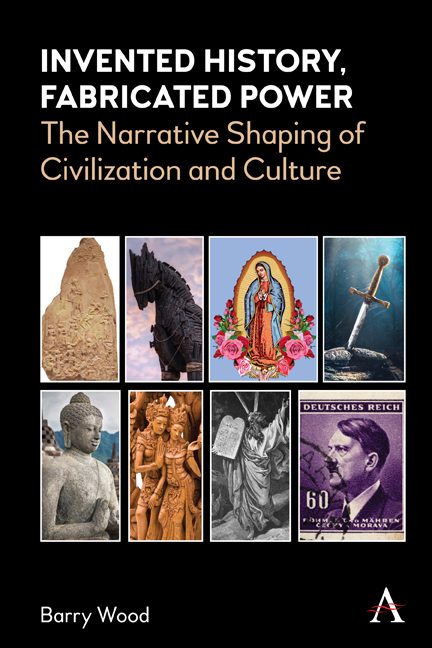Book contents
- Frontmatter
- Dedication
- Contents
- Acknowledgments
- About the Cover
- List of Abbreviations
- Introduction
- Prologue: The Prehistory of Power: Souls Spirits, Deities
- Part One Kings and Emperors
- 1 Divine Kingship in Mesopotamia
- 2 Pharaohs among the Indestructibles
- 3 Kingship among the Hebrews
- 4 The Deification of Roman Emperors
- 5 The Deva-Rajas in India and Southeast Asia
- 6 The Chinese Mandate from Heaven
- 7 The Japanese Imperial Cult
- Part Two Empires before the Common Era
- 8 The Legendary Empire of the Sumerians
- 9 Legendary Empires of Preclassical Greece
- 10 Patriarchs, Exodus, and the Epic of Israel
- 11 Legendary Empires of Ancient India
- 12 The Legendary Founding of Rome
- Part Three Founders
- 13 Moses: The Israelite Lawgiver
- 14 Buddha and Legends of Previous Buddhas
- 15 The Savior Narratives
- 16 Muhammad, the Qur’an, and Islam
- 17 The Virgin Mary through the Centuries
- 18 Tonantzin and Our Lady of Guadalupe
- Part Four Empires of the Common Era
- 19 Narrative Inventions of the Holy Roman Empire
- 20 The Epic of Kings, Alexander the Great, and the Malacca Sultinate
- 21 The Franks, Charlemagne, and the Chansons de Geste
- 22 The Legendary Kingdom of King Arthur
- 23 Ethiopian Kings and the Ark of the Covenant
- 24 Narratives of the Virgin Queen
- Part Five Ideologies
- 25 Discovery: The European Narrative of Power
- 26 Epics of the Portuguese Seaborne Empire
- 27 Dekanawida and the Iroquois League
- 28 The New England Canaan of the Puritans
- 29 The Marxist Classless Society
- 30 Adolph Hitler: Narratives of Aryans and Jews
- Epilogue: A Clash of Narratives
- Bibliography
- Index
- About the Author
25 - Discovery: The European Narrative of Power
Published online by Cambridge University Press: 15 December 2020
- Frontmatter
- Dedication
- Contents
- Acknowledgments
- About the Cover
- List of Abbreviations
- Introduction
- Prologue: The Prehistory of Power: Souls Spirits, Deities
- Part One Kings and Emperors
- 1 Divine Kingship in Mesopotamia
- 2 Pharaohs among the Indestructibles
- 3 Kingship among the Hebrews
- 4 The Deification of Roman Emperors
- 5 The Deva-Rajas in India and Southeast Asia
- 6 The Chinese Mandate from Heaven
- 7 The Japanese Imperial Cult
- Part Two Empires before the Common Era
- 8 The Legendary Empire of the Sumerians
- 9 Legendary Empires of Preclassical Greece
- 10 Patriarchs, Exodus, and the Epic of Israel
- 11 Legendary Empires of Ancient India
- 12 The Legendary Founding of Rome
- Part Three Founders
- 13 Moses: The Israelite Lawgiver
- 14 Buddha and Legends of Previous Buddhas
- 15 The Savior Narratives
- 16 Muhammad, the Qur’an, and Islam
- 17 The Virgin Mary through the Centuries
- 18 Tonantzin and Our Lady of Guadalupe
- Part Four Empires of the Common Era
- 19 Narrative Inventions of the Holy Roman Empire
- 20 The Epic of Kings, Alexander the Great, and the Malacca Sultinate
- 21 The Franks, Charlemagne, and the Chansons de Geste
- 22 The Legendary Kingdom of King Arthur
- 23 Ethiopian Kings and the Ark of the Covenant
- 24 Narratives of the Virgin Queen
- Part Five Ideologies
- 25 Discovery: The European Narrative of Power
- 26 Epics of the Portuguese Seaborne Empire
- 27 Dekanawida and the Iroquois League
- 28 The New England Canaan of the Puritans
- 29 The Marxist Classless Society
- 30 Adolph Hitler: Narratives of Aryans and Jews
- Epilogue: A Clash of Narratives
- Bibliography
- Index
- About the Author
Summary
The fifteenth century brought about profound changes in that it shaped the history of the world over the next three hundred years. European attitudes were shaped by the Reconquista, a long struggle to rid the Iberian Peninsula of Muslims. Centuries of Christian–Muslim conflict had led to an abhorrence of Muslims as infidels and other religions as heretical, pagan, and barbarian. Meanwhile Europe was on a path to invincible sea power. The development of the caravel with its V-hull and moveable sails opened up the open ocean for exploration, even into the wind through the sailing strategy of tacking. The leader in understanding the possibilities of this new power was the Portuguese Henrique (1394–1460) whose interest in geography and his commissioning of mapmakers led to his reputation as the “Navigator,” though this description came centuries later, and Henry himself never went to sea.
Henry brought an expansive imagination and the caravel together to promote Portuguese expansion beyond Europe. In his lifetime this tiny European nation took control of the Azores and a string of outposts down the coast of Africa. Inspiring vistas opened up. Following Henry's death, the Portuguese sent out successive expeditions south along the African coast, each one pushing farther south until an expedition rounding of the Cape of Good Hope in 1497 and founded a colony at Goa on the coast of India. Meanwhile the Italian-born Christopher Columbus, inspired by visions of Cathay (China), Capango (Japan), and India from The Travels of Marco Polo, dreamed of sailing west to reach the East. After a campaign of persuasion with the Spanish monarchs, King Ferdinand and Queen Isabella, he was outfitted with three ships that took him to a landing in the Americas in 1492.
An issue emerged with Portuguese landings on the coast of Africa that brought them into conflict with the Saracens, the regional name for Muslims. Without hesitation in 1452 Pope Nicholas V issued a papal bull, Dum Diversas (Until Different), that conferred authority on the Portuguese king, Alfonso V, to subdue and conquer the Saracens.
- Type
- Chapter
- Information
- Invented History, Fabricated PowerThe Narratives Shaping Civilization and Culture, pp. 287 - 296Publisher: Anthem PressPrint publication year: 2020

